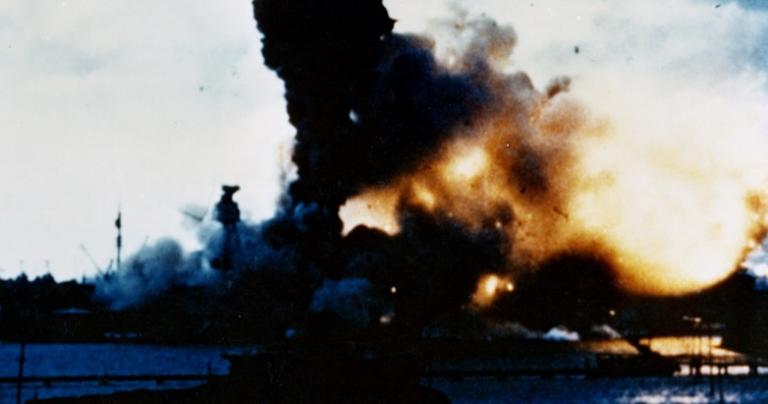They still remember Pearl Harbor at the ceremonies in our government and my guess is that they will while direct memory of the event endures. It is meet and right so to do.
When the veterans remember Pearl Harbor, they recollect reality. The rest of us look backwards and try to have pious thoughts, though in an ahistorical age, those are hard to have. The brave lads are now just the “olds” (as my students say) and we are not quite sure if they are relevant or even quite acceptable. They are apt to remember Pearl Harbor just as they do the Alamo.
 We have mixed feelings about these memories. Here is a rule: people who did not experience an event will see nuance in it that escapes those that were there. If you were in Twin Towers on 9/11 or there as the terrorists attacked, then you see evil being fought by good.
We have mixed feelings about these memories. Here is a rule: people who did not experience an event will see nuance in it that escapes those that were there. If you were in Twin Towers on 9/11 or there as the terrorists attacked, then you see evil being fought by good.
A Strength and Weakness in the Academic Memory
The memory of the academic is more nuanced, and there is great good to this, but also dangerous. Every event has so many causes that God alone knows every connnection, but an academic can get a dissertation from finding a few no other scholar has found. Still not all causes or connections are as vital as others.
Adam’s fall? That was a root cause of the terrorist attack on 9/11. Mistakes in American foreign policy and European colonialism were not immediate causes, but helped create the world in which terrorism would thrive. Radical and twisted forms of Islam pumped poison into the minds of young men. That was a proximate cause.
Still the fact remains that most young men in the Middle East, even those exposed to the evils done by the West and the poison brewed in the East, did not become mass murderers. They might grumble or consider direct action, but some decency kept them from the final act. The common image of God in every person checks a man and he does not do what he thought he might. He listens to the Will of God that is hard to hear, but is the heart of all of us.
Historians, theologians, and philosophers should find the subtle connections, but not miss the being there. The cause, the chief and great cause, was the evil men did on 9/11 or 12/7.
The evil men of 9/11 or the misguided and tyrannical Imperial war machine of Japan did not listen to the still small voice of divinity as others did and so brought horror down on us and death on themselves. The men who ordered the attack on the World Trade Center and on Pearl Harbor and those who executed the orders are the chief reason for the death and destruction of 9/11 or 12/7 and so they live in infamy as they died in shame and dishonor.
They came, they saw, they murdered.
When those that were there, and a few poets and others still gifted with imagination, remember Pearl Harbor or the World Trade Center, they live the reality of the evil and the good of those days.
Remember
We do not teach memory the way the ancients did. When we get to the passages of Homer that list all the ships of the Trojan War, we wonder why this is there. The war was ancient history when Homer wrote of it. Why list the ships? Of course, in part this was fan service as the great poet related the families of his day to the events of the past. Great-great-great-a-great-many-greats-grandfather was there!
There is more too it than that. If you are taught to recollect, if you do this in rememberance of a great deed or the greater dead, then you learn to be there. You need the ship list, because you are with the Greeks besieging the city, just as you are a Trojan counting the allies who might come to save Troy.
Troy burns still in a rich imagination and Virgil has a lesson or two to teach you from that event.
I suspect that the chief function of imagination is not to entertain us or pass time away, but to enable to live the lessons of the past. If you heard a relative describe World War II and you had an imagination, you could, in one sense, be there. You experienced the deeds of courage and the darkness of Nazi evil in the words of a West Virginia story teller.
You were there.
So it should be when we remember Pearl Harbor: we can be there. We can know if we bother to hear the stories, listen to the tales, and then preserve them with the genius of some American Homer like Frank Capra. When I first heard of the murder of the Russian Imperial family and the deaths of millions that followed, I dreamed of it, still dream of it, as if I was there.
I was not and yet was.
I cannot forget in any case that moment or Pearl Harbor or 9/11. They teach me.
Christmas is coming as it does after Pearl Harbor Day and then we will be in Bethlehem with the Baby wrapped in swaddling clothes and lying in a manger. There will still be no room in the Inn and Herod will still bring an end to the lives of babies to keep his throne safe.
We must be there. We don’t fondly recall . . . But in God, by a sanctified imagination, we run with the shepherds, stand in awe with Joseph, and kneel with the wisemen.
Remember. Remember. Not just on the 25th of December.











